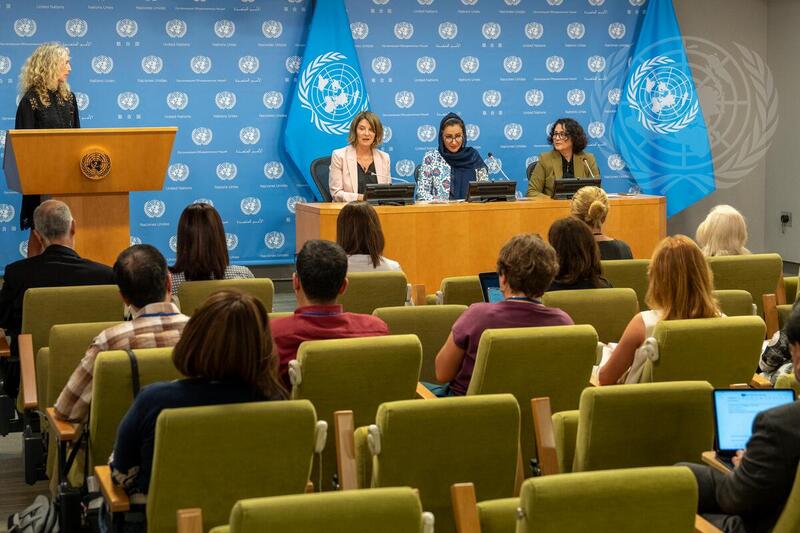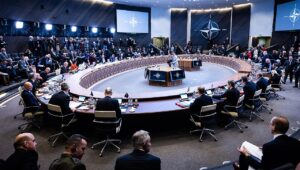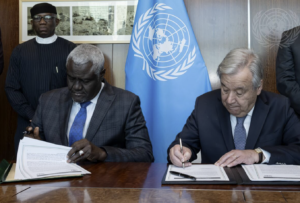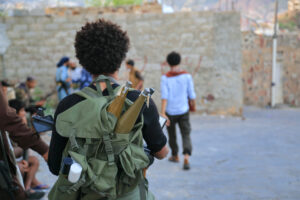A little over a year into Taliban rule and Afghans remain under severe political, economic, and humanitarian duress. A UN report in July details the contracting economy, high poverty and unemployment rates; acute food, housing, education, and medical insecurity; a financial and banking crisis with a depleted central bank, including seized assets; as well as landmines and IEDs from decades of war. There are estimates that nearly half the population—close to 18.9 million people—are “acutely food insecure”. Civilians have risked their safety and protested the de facto authorities’ discriminatory and restrictive decrees1Note: United Nations, UNAMA Human Rights Service, Human Rights in Afghanistan: 15 August 2021 to 15 June 2022, (July 2022), available from https://unama.unmissions.org/sites/default/files/unama_human_rights_in_afghanistan_report_-_june_2022_english.pdf, pages 22-23, 31. Those violating the decrees have faced cruel and inhuman punishments, including extrajudicial killings with women accounting for the majority of victims. See, United Nations, Security Council, The situation in Afghanistan and its implications for international peace and security: report of the Secretary-General, A/76/862 (15 June 2022), available from undocs.org/en/A/76/862, paragraph 69. ; in response, the Taliban has continued to erode civic space through arrests, enforced disappearances, and detention of protesters, journalists, members of the media, and human rights defenders.2Note: Ibid., paragraphs 9, 36, 37, and 38; United Nations, Media Center, Interactive dialogue on the High Commissioner’s report on Afghanistan, 7 March 2022, https://www.ohchr.org/en/statements/2022/03/interactive-dialogue-high-commissioners-report-afghanistan. Afghans feel abandoned, and have continued to call for international support given the Taliban’s eradication of protection mechanisms, such as the abolition of the Ministry for Women’s Affairs which provided technical assistance and oversight to central and provincial leaders in implementing gender-related social, political, and legal rights.
In the absence of human rights mechanisms, and restricted and limited humanitarian assistance, there have been increased attention towards the UN Assistance Mission in Afghanistan (UNAMA)—a Special Political Mission operating since 2002. In March 2022, the UN Security Council renewed UNAMA’s mandate3Note: The UN Security Council renewed UNAMA’s mandate on 17 March 2022. Security Council resolution 2626, S/RES/2626 (17 March 2022), available from undocs.org/en/S/RES/2626. for another year, retaining its monitoring, reporting, humanitarian, and development role, but focusing its political and capacity-building role to addressing new security challenges. Not surprisingly, the mandate renewal process was contentious, particularly on issues such as the level of appropriate engagement between UNAMA and the Taliban, risk management and aid diversion, as well as the root causes of the overlapping crises ailing Afghanistan.
In this context, serious questions have been raised by civil society about whether UNAMA’s mandate is still fit for purpose, how aid can more effectively reach civilians, how the needs of the population will be centered domestically and internationally, what mechanisms exist to further protection efforts, as well as what tangible progress has been made in the service of Afghans. UNAMA’s activities in the past year signal its sensitivity to some of these challenges, and its humanitarian and human rights engagements are especially noteworthy.
UNAMA’s Key Engagements
Given UNAMA’s difficult position following the Taliban’s takeover, the UNSC specifically requested the mission engage national and subnational stakeholders, CSOs, international NGOs, and donors to protect and promote human rights and humanitarian assistance.4Note: Ibid., paragraphs 5b, c, and e. However, humanitarian actors and organizations have faced delays and denials in transferring funds, lack cash in-country to carry out assistance efforts, and have faced both access and freedom of movement constraints by the Taliban. In response, the UN and UNAMA have helped facilitate and distribute imported cash to 19 UN agencies and programmes, and 15 NGOs in country.5Note: The situation in Afghanistan and its implications for international peace and security, (15 June 2022), paragraph 47. Internationally, UNAMA has advocated to the U.S. Department of Treasury to unfreeze Afghanistan’s Central Bank assets6Note: Ibid. paragraph 46. , which can restore the Afghan economy, increase liquid cash in-country, and allow funds to pay salaries of public sector employees. Although UNAMA’s engagements cannot on their own ease the financial crisis, it is these activities in partnership with other humanitarian actors that have allowed over 20 million Afghans to receive some form of humanitarian assistance. Ongoing humanitarian assistance is required, and UNAMA will need to coordinate more robust temporary solutions with the broader UN network—such as operationalizing the Humanitarian Exchange Facility or scaling humanitarian and development efforts by helping to establish several emergency trust funds and diversifying aid channels via neighboring countries (as recommended by this Stimson Center issue brief). Such activities would increase access to liquid cash that NGO assistance programs rely on.
In addition, UNAMA’s efforts now include engagement with de facto authorities and interlocutors at the “central, provincial, and district levels” in order to provide technical assistance and trainings on international human rights standards.7Note: UNAMA has engaged with Ministries of Foreign Affairs, Interior, Defense, Propagation of Virtue and Prevention of Vice; the General Directorate of Intelligence, Attorney General’s Office of Prison Administration, and police, penitentiary, and justice departments. United Nations, UNAMA Human Rights Service, Human Rights in Afghanistan, pages 4-6. This is significant because Afghanistan is party to 11 international treaties and in the absence of a national human rights mechanism and little direct international engagement with the Taliban, UNAMA is the main actor both documenting violations of the treaties as well as raising credible reports to relevant ministries.8Note: Ibid., page 4 footnote 6 for a list of treaties, conventions, and protocols. Human rights violations as well as civilian casualties are outlined throughout the report. Similarly, through the Civil Society Joint Working Group9Note: Civil society representatives voiced the impact of the de facto authorities’ restrictions on dress, expression, movement, assembly, female humanitarian actors, and female participation in public and political spaces. Participants also discussed challenges around the closure of women’s shelters and increasing gender-based violence. United Nations, Security Council, The situation in Afghanistan and its implications for international peace and security, (28 January 2022), paragraph 14. and engagement with women’s organizations, UNAMA has facilitated a safe10Note: Researchers will need to continue tracking whether UNAMA’s engagements with civil society groups and civilians has led to retributions for those participating in discussions and meetings with UNAMA. space for civil society representatives to express their priorities and challenges, allowing the mission to center the needs of communities in their dialogues with de facto authorities. At the same time, the mission has collaborated with “women, youth, religious scholars, community elders, and civil society” as a part of broader efforts to “implement local peace and outreach initiatives”.11Note: United Nations, Security Council, The situation in Afghanistan and its implications for international peace and security, (15 June 2022), paragraph 13. Given that current justice mechanisms are neither accessible nor equitable12Note: Ibid., paragraphs 10, 40, 43, 72. , UNAMA’s efforts in bolstering local initiatives and conflict resolution mechanisms are indispensable and signal the need for stronger national and local mechanisms to avoid a serious vacuum of services when the mission draws down.13Note: Engagements bolstering local mechanisms are key given that the justice system is limited due to resource and capacity issues, exclusion of women in the justice sector, unclear legal frameworks, and gender-based violence cases handled in personal rather than criminal courts. See, Ibid., paragraph 10 and 40 and United Nations, Security Council, The situation in Afghanistan and its implications for international peace and security, (28 January 2022), paragraph 8.
Drawing Attention to Human Rights Abuses
UNAMA has received criticism that its engagements with the Taliban have done little to improve protections for Afghans. Despite UNAMA’s publicized and private meetings with the Taliban, such criticism raises questions about what role UNAMA can realistically play under Taliban rule despite strong language in its mandate14Note: The UNSC has directed UNAMA to monitor and report on violations and abuses against civilians, as well civil, political, social, economic, and cultural developments pertaining to fundamental rights. Security Council resolution 2626, S/RES/2626, paragraphs 5c-g. to protect human rights. Although UNAMA’s engagements have not resulted in systematic changes in securing human rights for Afghans, UNAMA’s documentation and verification of the human rights context demonstrate areas of meaningful contributions.
Currently, journalists and media workers have been self-censoring, with a vast majority of media outlets closed or threatened with closure. Further, although there are no explicit restrictions on international organizations from supporting Afghan civil society groups, the fear of repercussions15Note: United Nations, Security Council, The situation in Afghanistan and its implications for international peace and security, (15 June 2022), paragraph 37. by de facto authorities limit the benefits of this option. Likewise, since the Taliban dissolved the Afghanistan Independent Human Rights Commission (AIHRC) which was responsible for monitoring, evaluating, and reporting on violations of human rights and humanitarian laws,16Note: “The AIHRC Position regarding the dissolution of the commission by the Taliban,” Afghanistan Independent Human Rights Commission, last modified May 26, 2022, accessed August 11, 2022, https://www.aihrc.org.af/home/press_release/1854449; The AIHRC was also responsible for providing protection to victims, including through reparations, truth seeking, and accountability. See, United Nations, Office of the High Commissioner for Human Rights, Human Rights Report 2021 (May 2022), available from https://www.ohchr.org/sites/default/files/2022-06/OHCHR_Report_2021.pdf, page 304. UNAMA’s Human Rights Service stepped in to verify,17Note: The Human Rights Services’ reports include violations that have been confirmed through at least 3 independent sources, including primary accounts from victims/witnesses where possible, as well as onsite fact-finding. See United Nations, UNAMA Human Rights Service, Human Rights in Afghanistan, page 5. monitor, document, and report on violations done by or under Taliban rule. UNAMA’s reporting covers violations such as indiscriminate attacks against civilians and non-military infrastructure, to the enforced disappearance, extrajudicial killing, detention, torture, and inhuman treatment of civilians, as well as restrictions on civic space, human rights defenders, aid workers, journalists, and marginalized groups.18Note: See United Nations, UNAMA Human Rights Service, Human Rights in Afghanistan. In the absence of a national human rights commission to thoroughly record or investigate abuses for accountability purposes, UNAMA has tracked contextual details on the actors involved (victims and perpetrators), actors’ affiliations, as well as type, pattern, location, and date of abuses, attacks, and violations—further strengthening its reports.
Perhaps the importance of UNAMA’s activities can best be exemplified through the reliance by the Office of the Prosecutor of the International Criminal Court (ICC) on UNAMA’s documentation and findings—deemed as “authoritative, reliable, and credible” — in its Pre-Trial Chamber II decision on the authorization of an investigation into Afghanistan on alleged crimes committed by the Taliban, among others. Recently, the ICC also requested UNAMA’s assistance to the Pre-Trial Chamber II which the mission has been able to fulfil. UNAMA’s reporting further highlights to the ICC the Taliban’s failure to take seriously and pursue justice in domestic courts—an important factor to pursuing international legal accountability.
UNAMA’s record keeping has also been critical as civil society groups and human rights defenders ceased their activities in most provinces.19Note: United Nations, Security Council, The situation in Afghanistan and its implications for international peace and security, (15 June 2022), paragraph 36. UNAMA’s engagement thus provides ample data against any future claims by the Taliban that it was unaware of human rights violations in its attempts to obstruct accountability. The Human Rights Service has additionally visited courts, the penitentiary system, and detention centers to collect and document the human rights situation. Given the removal of national “specialized prosecution units, … courts,” and mechanisms from the Taliban’s 2022 budget20Note: United Nations, UNAMA Human Rights Service, Human Rights in Afghanistan, pages 35-37, and 39. , UNAMA’s monitoring and reporting activities are thus filling a critical gap in country.
Looking Ahead
UNAMA has received fair questions and criticisms about the impact of its activities in the past year, and the mission is navigating a difficult balancing act. If there is engagement without ongoing calls for accountability for the human rights abuses committed by the Taliban, the mission runs the risk that it may be viewed as complicit with the de facto authorities. There is no doubt that the mission will continue to be called upon by the international community to respond to the needs of Afghans from economic assistance to the protection of fundamental rights which the Taliban has increasingly limited. As such, it is important to understand both where UNAMA is falling short, and where the mission has successfully contributed to protecting human rights and advancing its mandate.
The role of civil society will be essential to any efforts to strengthen UNAMA’s mandate moving forward. Civil society groups and representatives can best attest to the efficacy of UNAMA’s role, particularly with respect to its protection of civilian mandate. However, as both UNAMA and OHCHR have noted, there have been and may continue to be repercussions for Afghans who cooperate with the UN.21Note: United Nations, Human Rights Council, Cooperation with the United Nations, its representatives and mechanisms in the field of human rights, (14 September 2022), page 18. Consequently, as we approach the mandate renewal process in March 2023, the UNSC will need to carefully consider the risks and reprisals groups may face for their engagement, particularly as the UN seeks to draw upon and center Afghans’ voices in ensuring that the mandate is fit for purpose.
Notes
- 1Note: United Nations, UNAMA Human Rights Service, Human Rights in Afghanistan: 15 August 2021 to 15 June 2022, (July 2022), available from https://unama.unmissions.org/sites/default/files/unama_human_rights_in_afghanistan_report_-_june_2022_english.pdf, pages 22-23, 31. Those violating the decrees have faced cruel and inhuman punishments, including extrajudicial killings with women accounting for the majority of victims. See, United Nations, Security Council, The situation in Afghanistan and its implications for international peace and security: report of the Secretary-General, A/76/862 (15 June 2022), available from undocs.org/en/A/76/862, paragraph 69.
- 2Note: Ibid., paragraphs 9, 36, 37, and 38; United Nations, Media Center, Interactive dialogue on the High Commissioner’s report on Afghanistan, 7 March 2022, https://www.ohchr.org/en/statements/2022/03/interactive-dialogue-high-commissioners-report-afghanistan.
- 3Note: The UN Security Council renewed UNAMA’s mandate on 17 March 2022. Security Council resolution 2626, S/RES/2626 (17 March 2022), available from undocs.org/en/S/RES/2626.
- 4Note: Ibid., paragraphs 5b, c, and e.
- 5Note: The situation in Afghanistan and its implications for international peace and security, (15 June 2022), paragraph 47.
- 6Note: Ibid. paragraph 46.
- 7Note: UNAMA has engaged with Ministries of Foreign Affairs, Interior, Defense, Propagation of Virtue and Prevention of Vice; the General Directorate of Intelligence, Attorney General’s Office of Prison Administration, and police, penitentiary, and justice departments. United Nations, UNAMA Human Rights Service, Human Rights in Afghanistan, pages 4-6.
- 8Note: Ibid., page 4 footnote 6 for a list of treaties, conventions, and protocols. Human rights violations as well as civilian casualties are outlined throughout the report.
- 9Note: Civil society representatives voiced the impact of the de facto authorities’ restrictions on dress, expression, movement, assembly, female humanitarian actors, and female participation in public and political spaces. Participants also discussed challenges around the closure of women’s shelters and increasing gender-based violence. United Nations, Security Council, The situation in Afghanistan and its implications for international peace and security, (28 January 2022), paragraph 14.
- 10Note: Researchers will need to continue tracking whether UNAMA’s engagements with civil society groups and civilians has led to retributions for those participating in discussions and meetings with UNAMA.
- 11Note: United Nations, Security Council, The situation in Afghanistan and its implications for international peace and security, (15 June 2022), paragraph 13.
- 12Note: Ibid., paragraphs 10, 40, 43, 72.
- 13Note: Engagements bolstering local mechanisms are key given that the justice system is limited due to resource and capacity issues, exclusion of women in the justice sector, unclear legal frameworks, and gender-based violence cases handled in personal rather than criminal courts. See, Ibid., paragraph 10 and 40 and United Nations, Security Council, The situation in Afghanistan and its implications for international peace and security, (28 January 2022), paragraph 8.
- 14Note: The UNSC has directed UNAMA to monitor and report on violations and abuses against civilians, as well civil, political, social, economic, and cultural developments pertaining to fundamental rights. Security Council resolution 2626, S/RES/2626, paragraphs 5c-g.
- 15Note: United Nations, Security Council, The situation in Afghanistan and its implications for international peace and security, (15 June 2022), paragraph 37.
- 16Note: “The AIHRC Position regarding the dissolution of the commission by the Taliban,” Afghanistan Independent Human Rights Commission, last modified May 26, 2022, accessed August 11, 2022, https://www.aihrc.org.af/home/press_release/1854449; The AIHRC was also responsible for providing protection to victims, including through reparations, truth seeking, and accountability. See, United Nations, Office of the High Commissioner for Human Rights, Human Rights Report 2021 (May 2022), available from https://www.ohchr.org/sites/default/files/2022-06/OHCHR_Report_2021.pdf, page 304.
- 17Note: The Human Rights Services’ reports include violations that have been confirmed through at least 3 independent sources, including primary accounts from victims/witnesses where possible, as well as onsite fact-finding. See United Nations, UNAMA Human Rights Service, Human Rights in Afghanistan, page 5.
- 18Note: See United Nations, UNAMA Human Rights Service, Human Rights in Afghanistan.
- 19Note: United Nations, Security Council, The situation in Afghanistan and its implications for international peace and security, (15 June 2022), paragraph 36.
- 20Note: United Nations, UNAMA Human Rights Service, Human Rights in Afghanistan, pages 35-37, and 39.
- 21Note: United Nations, Human Rights Council, Cooperation with the United Nations, its representatives and mechanisms in the field of human rights, (14 September 2022), page 18.




